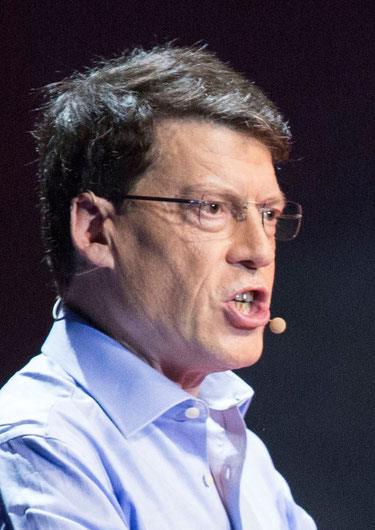Le conférencier Laurent ALEXANDRE

PHOTO Par Olivier EZRATTY — Flickr, CC BY 2.0, https://commons.wikimedia.org/w/index.php?curid=94671178

Chirurgien et urologue de formation, LAURENT ALEXANDRE est également diplômé de Science Po, d'HEC et de l'ENA. Hyperactif et pionnier
d'internet, ce coureur de marathon est le co-fondateur, dans les années 90, de Doctissimo.fr avec Claude Malhuret qu'il a ensuite revendu 140 Millions d'euros à Lagardère. Auteur en 2011 d'un
essai intitulé « La mort de la mort », LAURENT ALEXANDRE s’intéresse aujourd'hui aux bouleversements que va connaître l'humanité
conjointement aux progrès de la science en biotechnologie.
La cartographie du génome humain, par exemple, va très prochainement modifier les pratiques de santé. La connaissance biologique précise de chaque patient va conduire les professionnels de santé
à adapter individuellement la réponse thérapeutique » indique LAURENT ALEXANDRE.
« La quantité de données de notre dossier médical va être multipliée par 1 million » prévoit-il. La démocratisation du séquençage du génome humain illustre cette avancée vers l’amoncellement des
données sur l’être humain. Ce séquençage permet d’identifier les risques de maladies que pourra déclarer une personne dans sa vie. Le coût du séquençage a été divisé par 3 millions. Il se situe
aux alentours de 1000 dollars et est réalisé en quelques heures. Le coût de la thérapie génique – où l’on intervient sur un bout de la chaîne ADN - été divisé par 1000.
« 1 million de personnes sont séquencées à ce jour. On sera tous séquencés dans les dix ans qui viennent, dans cette salle » déclare-t-il. Et on retrouve Google. « Le co-fondateur de Google
Sergey Brin a appris en 2010 qu’il avait un risque d’attraper la maladie de Parkinson, et non en 2040 quand les premiers signes pouvaient se manifester » décrit-il. Pour le créateur de Google, la
tentation est donc grande d’orienter les développements vers la cure de cette maladie. Au final, pour l’ensemble de la population, les questions éthiques vont devenir cruciales. « Il faudra
choisir entre vivre 75 ans sans les NBIC ou vivre 1000 ans avec les NBIC » conclut-il.

Co-founder of the website Doctissimo.fr, expert in new technologies and artificial intelligence and President DNA sequencing company.
Trained as a surgeon and urologist having graduated from Science Po, HEC and ENA.
During the 1990s, this hyperactive internet pioneer, who runs marathons, co-founded Doctissimo.fr with Claude Malhuret. In 2011 LAURENT
ALEXANDRE wrote a paper entitled “La mort de la mort” (Death of Death), and nowadays takes an interest in future upheavals threatening the human race alongside progress in
biotechnology.
An avid follower of transhumanism, he frequently writes press articles on the subject. A keen supporter of Alain Madelin and admirer of Jacques Attali, he is also a columnist for both the
Huffington Post and Le Monde.
In 2000, LAURENT ALEXANDRE set up Medcost, publishing company for the Doctissimo website that Lagardère bought for €139 million in
2008.
In 2004, he founded a Belgian DNA sequencing company. In September 2013, online marketing firm Hi-Media, which had acquired an equity stake in DNA Vision one year beforehand, sold its stake to
Groupe Hima owned by LAURENT ALEXANDRE. Following the transaction, the DNA Vision shareholders were Groupe Hima with a 68% stake,
Laurent Alexandre with 28% and JCG Médias with 4%.
Mini interview for one event :
Could you provide an example of a Quality of Life initiative in your area of expertise that recently caught your attention ?
Google is moving into the world of healthcare, particularly cancer research. With the use of artificial intelligence, several subsidiaries of Google are now working to fight different
diseases including cancer. Google has become an unexpected challenger for the pharmaceutical industry!
The theme of our 50th anniversary celebration is "Imagine Quality of Life". Give us a glimpse into one aspect that you would like to address.
I’ll talk about the challenges related to food and the importance of nutrition. Poor health indicators in the United States show just how much poor nutrition impacts people’s health. Spending
billions of dollars on healthcare is much less effective than improving the way people eat. This means that nutrition is more important than curative medicine.
Looking ahead to 2050, Sodexo for example will have a key role to play in healthcare – which will be first and foremost preventive and personalized.
What do you see as the biggest Quality of Life challenge for the future? What innovation can help meet this challenge ?
Once again, taking the US as an example shows just how important nutrition is for our health. Learning how to eat well again is a major challenge for the future. With modern genetics, we see that
food changes how our chromosomes behave: it’s the science of epigenetics. DNA and what we eat are two continents that are becoming one. With tools such as community applications, we’ll be able to
help people make progress with their nutrition, offering for example personalized monitoring.
